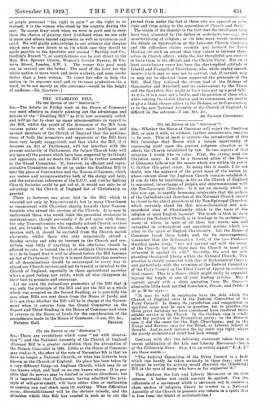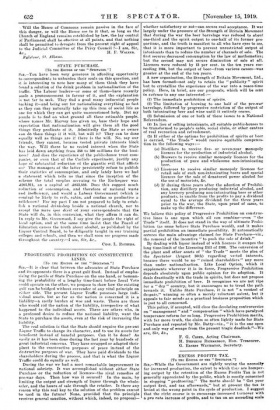[To THE EDITOR OF TUE " SPECTATOR.") Sin,—Whether the House
of Commons will reject the Enabling Bill, or pass it with, or without, further amendments, remains to be seen. This at least is certain—the introduction of this Bill furnishes that House with a unique opportunity of expressing itself upon the present religious situation as ;t affects the Church established by law. To two aspects of that situation I would like to refer. First, the crying need for Christian unity. It will be a thousand pities if the House of Commons fails to use the means which are within its power to further this great cause. In doing this it would, I do riot doubt, win the approval of the great mass of the nation by whose consent alone the Anglican Church remains established. It can do this by legalizing, so far as the Church of England is concerned, interchange of pulpits and intercommunion with the Non-Episcopal Churches. Is it not an anomaly which, in this new age, is rapidly becoming intolerable that the pulp it of the Cathedrals and churches of the National Church should be closed to the ablest preachers of the Non-Episcopal Churches, which certainly stand for that non-ecclesiastical and non- sacerdotal view of Christianity which is the basis of the religion of most English laymen? The truth is that in these matters the National Church is in bondage to its eccleaiastics, many of whom, in spite of all their fair words, are still entangled in ecclesiastical and sacerdotal notions which are alien to the spirit of English Christianity. Let the House of Commons break these bonds, and, for its encouragement, remember that the Reformation itself, if the late Professor Gwatkin spoke truly, "was not carried out with the assent of the Church, but the State took the Church in hand and reformed it against its will." Secondly, the need for safe guarding theological liberty within the National Church. This question is closely connected with that of Ecclesiastical Courts, and particularly with the retention of the Judicial Committes of the Privy Council as the Final Court of Appeal in ecclesias. tical causes. This is a theme which might easily be expanded beyond the length of one of your leading articles. May 1 content myself with a short quotation from Mr. Emmeei admirable little book entitled Conscience, Creeds, and Critics 1 At p. 39 he says :— " It may be well to emphasise here the debt which the Church of England owes to the Judicial Committee of 1 hi Privy Council. In theory its jurisdiction and composition in spiritual cases may be open to question, but in practice Ow three great decisions we have considered have rendered incal- culable service to the Church. In the Gorham case it vindi- cated the position of the Evangelical party; in the Bennett case it did the same for the High Churchman; and in ths Essays and Reviews case for the Broad, or Liberal, School of thought. And in each instance the lay court was right, where the purely ecclesiastical court had been wrong."
Contrast with this the following statement taken from a recent publication of the Life and Liberty Movement—No. 5 of the Fellowship News. At p. 4 in an article signed "F. A. I." are these words :— " The Judicial Committee of the Privy Council is a body which can hardly be taken seriously in these days: and an attempt to revive its activity would discredit the [Enabling] Bill in the eyes of many who have so far supported it."
This discloses the Life and Liberty Movement in its true (*lours. A better test could scarcely be applied. Can the adherents of a movement which is obviously out to remove a sheet anchor of religious liberty be trusted in a National Assembly of the Church to promote any reform in a spirit that is free from the blieht of ecclesiasticism ? Will the House of Commons remain passive in the face of this danger, or will the House see to it that, so long as the Church of England remains established by law, the lay central af Parliament shall be effective at all points, and that nothing shall be permitted to derogate from the present right of appeal to the Judicial Committee of the Privy Council P-1 am, Sir,







































 Previous page
Previous page